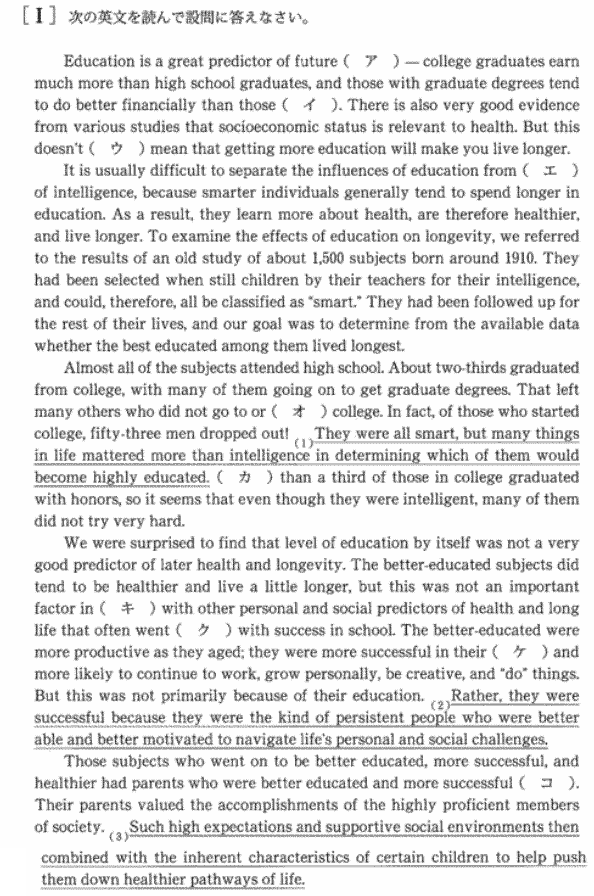| 1. 本文中の(ア)~(コ)に入れるのにふさわしい単語になるように解答欄のつづりを完成させなさい。(活字体を使うこと) |
| (ア)(イ). |
| Education is a great predictor of future(ア) - college graduates earn much
more than high school, and those with graduate degrees tend to do better
financially than thos (イ). |
|
| ア解説 |
| -以下の文college graduates earn much more than high school |
| 大卒は高卒より多くの収入を得るより 収入が入る。 |
|
収入:(an) income; earningsのうち earn an income 《of》より アはincome
|
|
| イ解説 |
| those with graduate degrees tend to do better financially than thos (イ). |
| those with graduate degrees :学士取得者とそうでない者との比較なので withに対してイはwithout |
|
| ウ解説 |
| There is also very good evidence from various studies that socioeconomic
status is relevant to health. But this doesn't (ウ) mean that getting more
education will make you live longer. |
be relevant to:関連性がある
this doesn't (ウ) mean:助動詞の後,動詞の前に位置するので文飾語の副詞が入る
|
| 社会経済地位は健康に関連するということが様々な研究により明らかになっている。しかしが非常に正当な証拠が、いろいろな研究からもあります。 これは(文意より)必ずしも高学歴をえることでより長生きできることを意味するわけではない。 |
| ウ答 necessaily |
|
| エ解説 |
| It is usually difficult to separate the influences of education fom (エ)
of intelligence, because smarter individuals generally tend to spend longe
in education. |
| separate A from B:AとBとを区別する より the influences of educationと influences
of intelligenceを区別する |
| 名詞の繰り返しを避けるために the influences の代わりに thoseを用いる |
| 教育の影響と知性の影響とを区別することは普通難しいものだ。なぜならより賢明な個人は一般に多くの時間を教育に費やす傾向があるからだ。 |
| エ答 those |
|
| オ解説 |
| About two-thirds graduated from college, with many of them going on to
get graduate degrees. That left many others who did not go to or (オ) college. |
,with many of them going on to get graduate degreesは付帯事情を表す独立分詞構文でwithを添えた形をとることも多い。
前文で「学位をえるために大学に進学し卒業した」あるので、
did not go to or (オ) college:go to college or finish college 大学へ進学しなかったか大学をやめたでオにはfinishが入る |
オ答 finish
|
|
| カ 解説 |
| (カ) than a third of those in college graduated with honors, so it seems
that even though they were intelligent, many of them did not try very hard. |
graduate with honors:優等で卒業する
前文 In fact, of those who started college, fifty-three men dropped out!
より Fewer than a third 3分の1より少ない |
| カ答 Fewer |
|
| キ ク解説 |
| The better-educated subjects did tend to be healthier and live a little
longer, but this was not an important factor in (キ) with other personal
and social predictors of health and long life that often went (ク) with
success in school. |
| in comparison with:~に比して ~に照らすと |
| go along with:(人・案などに)賛成[同調]する, 協力する |
| キ答 comparison ク答 along |
|
| ケ 解説 |
The better-educated were more productive as they aged; they were more successful
in their (ケ) and more likely to continue to work, grow personally, be creative,
and “do" things.
|
| in their とあるので 複数形 |
| ケ 答 careers |
|
| コ 解説 |
| Those subjects who went on to be better educated, more successful, and
healthier had parents who were better educated and more successful (コ). |
| ~had parents who were better educated and more successful themselves.自分自身が高学歴でより成功していた両親をもっていた |
| コ答 themselves |




